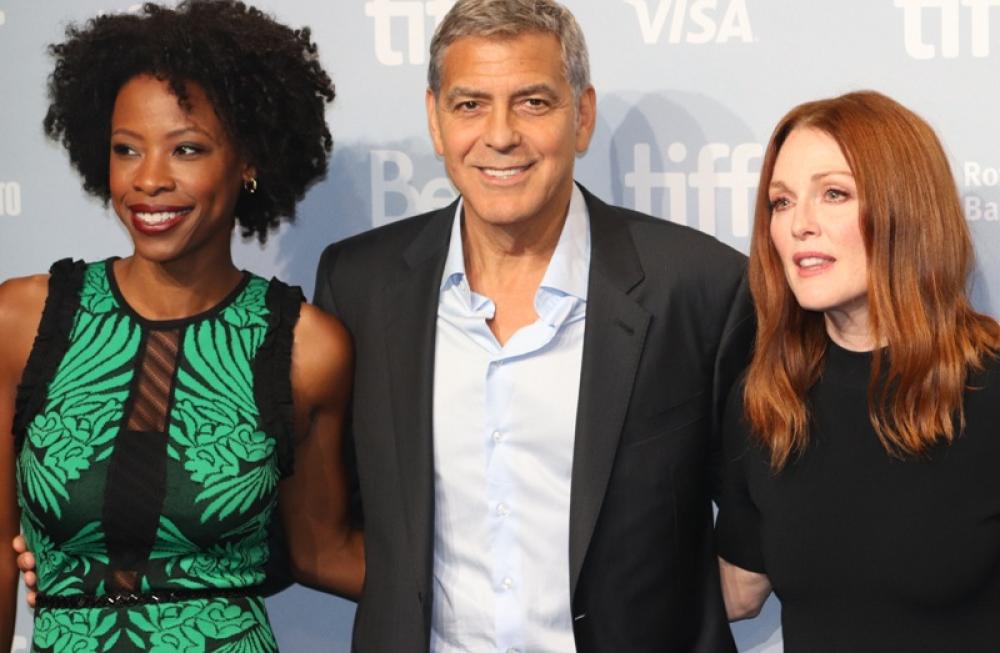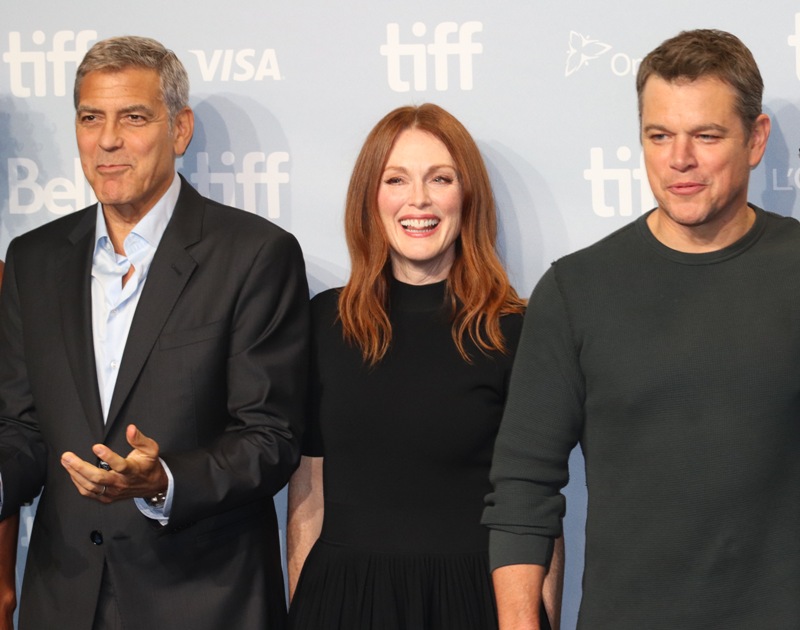Just Earth News | @justearthnews | 12 Sep 2017, 10:03 am Print

Two movies became one in Suburbicon. How did that happen?
Grant (Heslov, writer) and I were looking at a piece about Levittown, Pennsylvania and an event that happened there. We had seen some things in the (US Presidential) campaign trail where they were talking about building fences and scapegoating Mexicans and Muslims and we are always reminded that these aren’t new things and new moments in our history and we thought it would be interesting to talk about it. We wanted it to be entertaining, not a documentary, so we merged it with Suburbicon because we thought it would be a funny idea to put it in the suburbs in the 1950’s, when we all thought everything was all so perfect...if you were a white straight male.
So there was this Coen Brothers script and you thought you can put these two together?
The Coen Brothers had offered me to play the part that Oscar Issac plays and they offered it to me in 1999. The film never got made and when I called up Oscar to do the part, people asked me why didn’t I play it...cause I got Oscar Issac, which is not a bad move.
Your movie is set in the north of the US, but when you hear about racism in America, it’s always the south that gets the blame. Your thoughts on that.
I grew up in Kentucky in the 60’s and 70’s and we sort of thought we were exercising this. Segregation had come to an end and we felt that the trajectory was going the right way, but it didn’t. It stalled. And when you see in films this kind of bigotry, it’s always Mississippi burning or always the southern guys saying terrible things and the north-east likes to say well we weren’t like that and you want to go, well you actually were. I thought that was an important part of it. Even in casting we had to make sure that we really didn’t have anybody with southern accents.

Did you grow up in a suburb?
No, I didn’t grow up in a suburb. I grew up in a small town in Kentucky, which was not the suburbs at all.
Let’s talk about the tone of the movie. On one hand you had the signature Coen Brothers blood and gore and on the other hand it was an elegant story about the early civil rights. How did you draw a balance between the two so as not to spoil the film?
Well, it was tricky. We had to change certain things while editing. Times changed while we were shooting...Trump was elected...and it changed some of the temperature of the film in a weird way, because the country (US) got angrier, irrespective of whichever side you were on. It reminded us that we have to play with this tone a little differently. We had scenes with Josh Brolin that were some of the funniest scenes we have ever shot. I send them to Josh afterwards but we had to cut him out, because, it felt the wrong tone suddenly. We had to tone down some of the slapstick stuff and make them a little more dangerous. Tone is what you win or lose on in films, in general and particularly when you are playing in this kind of genre. I have had it go both ways. We tested the film knowing what tone we wanted and core was a big piece of the tone.
You talk about so many burning issue in the film and there’s so much going on in the US in terms of destruction, both natural and man made. Tell us, how do plan to make this world a better place?
I guess you are talking about Houston and Florida...we are all worried about that. You see, in Houston, it’s going to take a long time and we are all going to have to be involved. You asked me how you’re going to make this world a better place...we need involvement, because Houston is Syria, quite honestly. People in Houston are now refugees based on something that had nothing to do with them. They did not do anything but they are now victims and they are out of their homes and they are going to be suffering for a long period of time and much like the people and children in Syria, we are going to have to find ways to be involved. That is our job as citizens of the world.
You made a little boy cry and got Matt Damon beaten up. What was their reaction when they read the script for the first time?
Well, it’s better than making Matt Damon cry and beating up a little boy. I just thought that was the right thing to do, right...I mean I shouldn’t be beating children. It wasn’t just about beating Matt up, one of the most fun moments I had on the sets was when the prop guy brought a normal sized bi-cycle over and I said no, we are going to have a bike about that big for Matt (points to a much smaller size) and put him on that. Matt’s obviously been a good sport and we have been good friends for a long period of time and there are very few actors in the world that are capable of being Jason Bourne and killing people and turn around be the buffoon who cannot do anything right. That little boy is something spectacular. He should be in-front of a camera. He’s normal and fun and both the boys were actually fantastic.
![]()
Why do you think the Coen Brothers never made the 1999 film with you?
It’s an interesting thing...they tired for years and I think they started writing in the mid 80’s. A lot of things happened. I think they have done film similar to this. They changed a few things and other writes had come on, so things were changed a little bit and the film never got made. Also a script can get caught up in a studio and the producer and the fees can get tied to it.
What was the most challenging scene for you to direct in this movie?
I would think the one with Karimah (Westbrook). The trickiest part was we were in a very racially diverse neighbourhood in Fullerton, California and we had about 350 extras who were going to hurl a lot of racial slurs and say a lot of pretty terrible things that are against any decent human beings’...what you would think as okay. To go around saying it to everyone that we are going to do something really awful and it’s going to feel terrible...we all just felt sick.
You have had a long association with Mr Damon. Tell us, was he your first choice to play the role of Gardner (the character in the film). Also tell us, you have been known to be a prolific prankster. Was casting him a prank too?
Matt was always the second choice. He was the best available. I have never seen a goat shaved before (laughs hysterically). Jokes aside, he was always the first choice for the film. This wasn’t a prank. I do pranks when I’m bored on the sets and have nothing else to do. When you’re directing you don’t have a whole lot of time to do terrible things. I benefited from having three wonderful actors. You can plan everything but you’ll still require smart, intuitive actors to carry you over the finish line and if you can’t...you get Matt
Images by Radha Bose/IBNS and Paramount Pictures
- TIFF: ‘Carry It On’ is a tribute to Canadian-American indigenous singer-songwriter Buffy Sainte-Marie’s life
- TIFF: ‘In Her Hands’ personifies Zarifa Ghafari’s courage in the run-up to Taliban takeover in Afghanistan
- Shekar Kapur's cross-cultural romcom 'What’s Love Got To Do With It?’ starring Shabana Azmi and Emma Thompson premieres at TIFF
- Vienna in audacious campaign strips on OnlyFans social network to showcase historical nude art
- Golden Week Holiday: Japanese join Tibet Festival Japan





-1763561110.jpg)
